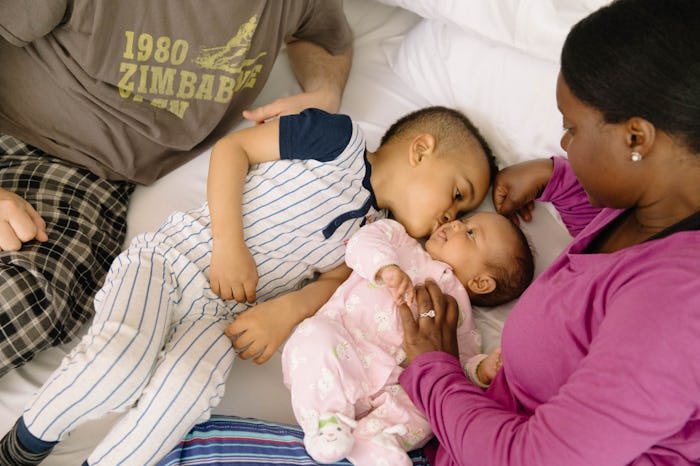Life
How To Create Happy Childhood Memories, According To Mental Health Professionals
If you're anything like me, you want your kids to look back on their childhoods and feel nothing but warm fuzzies. My parents learned how to create happy childhood memories for me and my siblings, so when I look back at my life as a child it's nothing but birthday parties, family vacations, the feel of my mother's cool hand on my face when I was sick, and the day we brought home our first kitten. Sure, I have a few unhappy memories of growing up in a less than perfect world, but the good far outweighs the bad.
Obviously, I want to do the same for my children. According to a 2018 study by the American Psychological Association, people who have fond memories of their childhood and relationships with their parents are healthier and happier as adults. And a CDC-Kaiser Permanente Adverse Childhood Experiences (ACE) study found that traumatic experiences during childhood can have the opposite effect, resulting in increased risk of addiction, mental health issues, trauma as adults, and life-threatening health conditions.
So, what can we, as parents, do to make sure our kids' lasting memories of their childhoods are good ones? To find out more about the human psyche and how to help our kids get through the tough moments that life will inevitably throw at them, Romper spoke with Jenn Walker, MA, a high school counselor in Omaha, Nebraska, and Reaca Pearl, MA, LPC, RYT, a therapist specializing in trauma-informed care, in Golden, Colorado.
As Pearl told Romper, giving your kid good memories isn't just important, it's essential. "I use the analogy of a house. Someone's foundation is solid, birth to age 6, they have all of their needs met — food, shelter, and lots of hugs, love, and attuned parental attention — meaning paying attention to their cues," Pearl tells Romper. "The baby learns how often their needs are met and begins to assess whether the world is OK or safe."
If that foundation is solid, says Pearl, that child will have stability. "If something that happens that's traumatic, that is a crack in the foundation," Pearl continues. "What we know helps kids gets through these things is resilience — having social and emotional support." That's where memories come in.
"The happy memories are the padding around the traumatic things that all of us experience, and you need even more padding if particularly bad things happen," Pearl says.
In order to create this sort of emotional safety-net, Pearl explains that you don't have to do much. "Kids learn through play, smiles, and present-centered connection," they tell Romper. "They know when you're present and you're not, which is not to say that parents can't have off days, it's not about being perfect, it's about when you remember to be present, to do it."
Adults typically remember those moments from childhood that made them feel. Did I feel like my mom saw me? Did I feel like my dad loved me?
According to Pearl, because we're social beings, non-sexual touch, like holding and hugging, is important. "Sometimes, we, as adults, need work through any issues we have with touch," Pearl says.
Pearl also notes that kids remember and hold onto the words we say, telling Romper, "We need to learn to extract the behavior of a child from who they are, which means no longer saying things like, 'You are a bad kid,' and, instead, recognizing that good kids have unacceptable behaviors."
Walker tells Romper that the teens she works with often talk about memories in terms of relationships. "I work with a lot of students who have close relationships with extended family — grandparents, aunts/uncles, cousins," she says. "I hear stories of family gatherings, reunions and cookouts. Time spent with family is always worth the effort." According to Walker, every child needs a close and trusted adult who is not their parents, too, so they can learn how to build close and healthy relationships outside of their immediate family that will benefit them throughout their lives.
In the end, a positive connection with adults is the key to creating positive, happy childhood memories. "Adults typically remember those moments from childhood that made them feel. Did I feel like my mom saw me? Did I feel like my dad loved me? Do I remember my grandmother's voice as she sang to me? Did I dance in the rain with my mom?" Pearl says. "Those little tidbits, experiences, and moments stay with us and shape who we are as adults."
